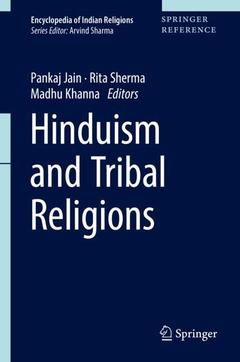Hinduism and Tribal Religions, 1st ed. 2022 Encyclopedia of Indian Religions Series
Coordonnateurs : Long Jeffery D., Sherma Rita D., Jain Pankaj, Khanna Madhu

This volume offers an overview of Hinduism as found in India and the diaspora. Exploring Hinduism in India in dynamic interaction, rather than in isolation, the volume discusses the relation of Hinduism with other religions of Indian origin and with religions which did not originate in India but have been a major feature of its religious landscape. These latter religions include Islam and Christianity and, to a lesser extent, Zoroastrianism and Judaism. The volume also covers Hinduism?s close association with Tribal Religions, sometimes called Primal Religions. As its second main theme, the volume examines the phenomenon of Hinduism in the diaspora. The Indian diaspora is now beginning to make its presence felt, both in India and abroad. In India, the Indian government annually hosts a diaspora event called Pravasi Bharatiya Divas (PBD), in recognition of the growing importance of the twenty-million-strong diaspora. Although not all Indians are Hindus, most are, both in India and abroad, and a strong sense of Hindu identity is emerging among diasporic Hindus.
This volume fills the need felt by Hindus both in India and the diaspora for more knowledge about modern-day Hinduism, Hindu history and traditions. It takes into account three main aspects of Hinduism: that the active pan-Indian and diasporic language of the Hindus is English; that modern Hindus need a rational rather than a devotional or traditional exposition of the religion; and that they need information about and arguments to address the stereotypes which characterize the presentation of Hinduism in academia and the media, especially in the West.
Adivasi.- Colonial Perceptions of Tribal Religion.- Khasi Religion.- Medical System of the Khos.- Religion of Bharias.- Religion of the Ao Naga.- Religion of the Ho Tribe.- Religion of the Raika-Rebari.- Religion of the Sumi Naga.- Religion of the Tiwas.- Abhinavagupta.- Abortion (Hinduism).- Acintya-bhedābheda-Tattva.- Adhikāra.- Adultery (Hinduism).- Agastya.- Agrahāra.- Ahalyā, the Human Face of Sacred Infidelity.- Aitareya Brāhmaṇa.- Akka Mahādevī.- Alcohol (Use of).- Alexander the Great.- Amṛtānanda Mayī Mā (Ammachi).- Anandamarga (Ānandamārga).- Appar.- Appayya Dīkṣita.- Arcāvatāra.- Ardhanārīśvara.- Arjuna.- Aryan [Āryan].- Astronomy.- Aum.- Auroville.- Auspiciousness.- Avidyā.- Aśvamedha.- Babri Masjid (Bābarī Masjid).- Bahuchara Mata (Deity of Transgenders).- Basava.- Basham, A. L..- Besant, Annie.- Bhandarkar, R.G.- Bharat Dharma Mahamandal.- Bhedābheda.- Bhoga.- Bhāgavata Purāṇa.- Bhārata Mātā.- Bhāravi.- Bhāskara.- Bhīma.- Bhīṣma.- Bioethics (Hinduism).- Birth Control.- Brahma Kumaris.- Brahma Sūtras (Vedānta Sūtras).- Brahman.- Brahmo Samaj.- Brahmotsava.- Brahmā.- Brāhmaṇa (Brahmin/Brahman).- Brāhmaṇas.- Bādarāyaṇa.- Bāuls.- Caribbean and Central America, Hinduism in.- Chatterjee, Bankim Chandra.- China (Hinduism).- Cilappatikāram (Śilappadigāram, Shilappadigaram).- Cinema, Hindu Themes in.- Citamparam (Chidambaram).- Dattātreya.- Daṇḍanīti.- Demon (Hinduism).- Devīmāhātmya.- Dharma.- Dhyāna.- Dhṛtarāṣṭra.- Education, Hindu (Ancient, Classical, Modern, and Contemporary).- Ekādaśī.- Environmentalism (Hinduism).- Ganesh Chaturthi (Gaṇeśa Caturthī).- Gaṅgeśa.- Gaṇeśa (Gaṇapati).- God, Overview.- Hagiography.- Hanumān (Hanumant, Hanūman).- Hariścandra.- Harivaṃśa.- Hastings, Warren.- Hijra (Hijaḍā).- Himālaya.- Hindu Charitable Endowments.- Hindu Diaspora in Portugal: the Case of our Lady of Fatima Devotion.- Hindu Mahasabha.- Hinduism and Commercialization.- Hinduism in Africa.- Internet, Hinduism on.- Jajmānī System.- Janābāi.- Jones, William.- Jīva Gosvāmin.- Jīvanmukti.- Kaaval Katavul (Guarding Deities).- Kaavu in Kerala (Sacred Groves in Kerala).- Kabīr.- Kali.- Kane, P.V.- Kaurava.- Kaśmir Śaivism.- Kirtan in North America.- Krishnamurti, Jiddu.- Kriya Yoga.- Kumbha Mela.- Kuntī.- Liṅgāyata.- Loka.- Lokāyata.- Lāl Ded.- Līlā.- Madhusūdhana Sarasvatī.- Maharishi Mahesh Yogi.- Mahā-vākya.- Mahābalipuram (Māmmalapuram).- Mahābhārata.- Mantra.- Manuscripts (Hinduism).- Mathematics.- Matrilineality (Hinduism).- Maṇimēkalai.- Maṇipravāḷa.- Meaning (Hinduism).- Medicine (Hinduism).- Meditation (Hinduism).- Megasthenes.- Menstruation: Pollutant to Potent.- Naiker, E.V. Ramaswami (“Periyar”).- Nambudiri.- Nammāḻvār.- Naraka.- Nathdwara.- Nationalism (Hinduism).- Navagraha.- Navarātri.- Naṭarāja.- Neo Vedānta.- Nimbārka.- Nirukta.- Nivedita, Sister.- Nivṛtti.- Niyoga.- Numbers.- Nyāya (and Navya-Nyāya).- Old Age.- Omniscience (Hinduism).- Pallava Dynasty.- Periya Purāṇam.- Pilgrimage – Hinduism.- Poṅkal (Pongal).- Prahlāda.- Prakṛti.- Pramāṇa.- Prapatti.- Prarthana Samaj.- Pratyabhijñā.- Prayaschitta.- Proverb (Hinduism).- Psychological Method.- Reason (Hinduism).- Rebirth (Hinduism).- Relativity (Hinduism).- Religious Tourism.- Rishikesh (Hṛṣīkeśa).- Sahaja.- Saints, Overview.- Samādhi.- Sanskrit (Saṃskṛt).- Sanskrit literature in Maharashtra folk art Keertan.- Sanskritization (Hinduism).- Sat.- Sati (Suttee).- Satyabhāmā.- Savarkar, Vinayak Damodhar (“Veer”).- Saṃnyāsa.- Science.- Scripture (Hinduism).- Shamanism.
Dr. Jeffery D. Long, Professor of Religion and Asian Studies, specializes in the religions and philosophies of India. He is the author of several books, including Hinduism in America: A Convergence of Worlds and Jainism: An Introduction, and numerous articles. He is also the editor of the series Explorations in Indic Traditions for Lexington Books. In 2018, he received the Hindu American Foundation’s Dharma Seva Award for his ongoing efforts to promote more accurate and culturally sensitive portrayals of Indic traditions in the American educational system and popular media. He has spoken in numerous venues, both national and international, including Princeton University, Yale University, the University of Chicago, and Jawaharlal Nehru University (in India), and has given three talks at the United Nations.
Professor Rita D. Sherma, PhD, is Director of the Mira and Ajay Shingal Center for Dharma Studies, Chair of Hindu Studies, and Associate Professor of Dharma Studies at the Graduate Theological Union, Berkeley, CA. She is Editor-in-Chief of the International Journal of Dharma Studies. Dr. Sherma is the editor of a number of volumes on themes in Hindu Studies and Dharma Studies, and author of numerous academic articles in multi-author anthologies. She is the Vice President of the Dharma Academy of North America (DANAM), a scholarly association and forum for academic research on Dharma Studies. Her forthcoming publications include Hinduism and the Divine: An Introduction to Hindu Theology, and Ecology, Ethics, and Enlightenment: A Hindu Ecotheologyfont-family.
Professor Pankaj Jain is an internationally recognized academic leader in Sustainability, Jain Studies, Film Studies, and Diaspora Studies. He is the Head of the Department of Humanities & Languages and the Chair of The India Centre at FLAME University. Earlier, he was the founding co-chair of India Initiatives GrouDate de parution : 12-2021
Ouvrage de 1822 p.
17.8x25.4 cm



